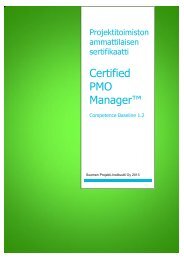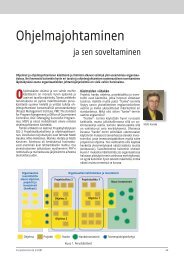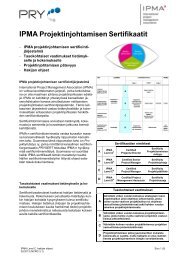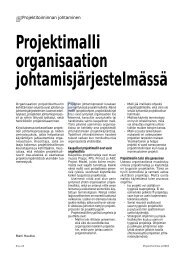Boundary activities and readiness for ... - Projekti-Instituutti
Boundary activities and readiness for ... - Projekti-Instituutti
Boundary activities and readiness for ... - Projekti-Instituutti
You also want an ePaper? Increase the reach of your titles
YUMPU automatically turns print PDFs into web optimized ePapers that Google loves.
Theoretical background<br />
detailed planning <strong>and</strong> execution stages, leaving the early initiation <strong>and</strong><br />
conception stage (as well as the time after project implementation) with less<br />
attention (Atkinson et al., 2006).<br />
Traditionally, literature on the early project stages has been dominated by<br />
the discussion on rational planning tools, such as the product breakdown<br />
structure, work breakdown structure <strong>and</strong> design structure matrix (e.g.<br />
Austin, Baldwin, Li, & Waskett, 2000; Bachy & Hameri, 1997), risk analysis<br />
approaches (e.g. Dawson & Dawson, 1998; Uher & Toakley, 1999), <strong>and</strong><br />
optimization models <strong>for</strong> project scheduling (e.g. Long & Ohsato, 2008; Shi<br />
& Deng, 2000). While project planning has evolved into a sophisticated<br />
discipline that leans on complex mathematical models, it has been<br />
increasingly questioned whether the results of this research are actually put<br />
into practice, as practitioners seem to dominantly rely on the most basic<br />
models (Packendorff, 1995). As Söderlund (2002) notes, project planning<br />
research is mainly based on the assumptions of clear goals, given tasks <strong>and</strong><br />
high analyzability of the project. These assumptions have been questioned<br />
especially by the proponents of the temporary organization perspective<br />
(Andersen, 2006; 2008; Packendorff, 1995) who recognize that the project<br />
or program task continuously evolves as the participants interact with each<br />
other <strong>and</strong> with the environment (Vaagaasar & Andersen, 2007). A study by<br />
Ericksen <strong>and</strong> Dyer (2004) demonstrated how the project team actively<br />
shapes the initial task, which may consist of just brief descriptions of the<br />
desired outputs <strong>and</strong> deadlines. The task is processed in discussions <strong>and</strong><br />
negotiations during project mobilization, gradually moving towards more<br />
operational tasks. Still, the initial task given to the team is important, as the<br />
nature <strong>and</strong> the framing of the task influence the actors’ perceptions, e.g. of<br />
the salience <strong>and</strong> urgency of the project. (ibid.)<br />
Most of the discussion on the management of early project stages has<br />
focused on construction projects <strong>and</strong> other delivery project contexts, where<br />
the early stage includes <strong>activities</strong> such as project marketing, tendering,<br />
supplier selection, <strong>and</strong> contract management. The present study focuses on<br />
internal change programs whose initiation <strong>and</strong> planning <strong>activities</strong> have<br />
received less attention. Several studies have pointed out how the traditional<br />
project planning methods <strong>and</strong> tools are better adapted to delivery projects<br />
than to internal projects, <strong>and</strong> how the initiation of change projects <strong>and</strong><br />
programs requires different kinds of methods due to their low analyzability,<br />
high uncertainty <strong>and</strong> dynamism (Besner & Hobbs, 2008; Lehner, 2009;<br />
Mikkelsen, Olsen, & Riis, 1991; Turner & Cochrane, 1993).<br />
Even though the early <strong>activities</strong> of internal change projects <strong>and</strong> programs<br />
have received little research attention, the related challenges have often<br />
been described. The early stage of an internal project may be slow, <strong>and</strong> it<br />
24









